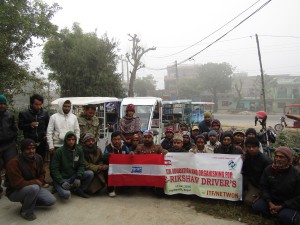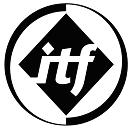
An e-rickshaw drivers committee is formed in Kapil Wastu District, western Nepal
From the 5th – 7th January, NETWON held a three day of education workshop for e-rickshaw drivers in Butwal, in the western region of Nepal. The workshop brought together the NETWON district committee leadership with e-rickshaw drivers working in region to discuss the problems faced by e-rickshaw drivers, and to formulate strategies about how to tackle these problems from a trade union perspective. The workshop introduced the drivers, who were all new NETWON members, to the basic tenets of trade unionism and to trade union organising strategies.
Following the workshop, a further basic trade union education workshop was held on January 10th in Jeetpu, in Kapil Wastu district. Following the workshop, an 11-person e-rickshaw drivers committee was formed. This committee was given an e-rickshaw union flag and union identity cards to give to new NETWON members in the region.
NETWON has now recruited around 1,100 new e-rickshaw members to the union and is in the process of registering a NETWON-affiliated e-rickshaw drivers’ association with the Department of Transport.
NETWON President, Ajay Kumar Rai, says that the new e-rickshaw members understand that they must become “unified” and “build a union” in order to address the problems they are collectively faced with, which include a lack of recognition for e-rickshaws as “public vehicles” by the government, which in turn fuels police harassment, and a lack of available parking space in cities.
Note: E-rickshaws (electric-rickshaws, also known as “city safaris”) are three-wheeled battery-powered vehicles which mainly operate in city and plane areas of Nepal. Less powerful and smaller than the 3-wheeled “Tempos” which are a common site in the Kathmandu valley area, e-rickshaws have become popular in recent years as a replacement for older style cycle-powered rickshaws.


26/01/2016 at 5:11 am
Good initiation, congratulation
Bidur